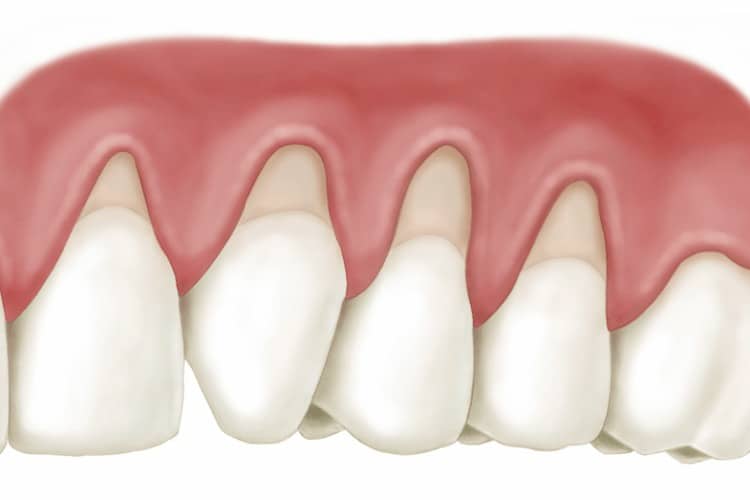What is gum disease/periodontal disease?
Gum disease, periodontitis, and periodontal disease all refer to the same type of infection. The condition is a disease that occurs around the roots of your teeth, where the infected gums around them begin to detach. As the gum attachments deteriorate, deep pockets are created around the roots (which then harbors additional plaque and tartar bacteria.) Deeper pockets also indicate bone loss in that space. The more severe the gum and bone infection, the greater at-risk you are for loose teeth or complete tooth loss.
What are the symptoms of gum disease?
Gum disease is usually easy to spot because it starts out as gingivitis, which includes bleeding and tender gums. Left untreated, gingivitis will eventually progress into more serious periodontal infections and you’ll see symptoms of:
- Tartar buildup
- Gum recession
- Bleeding
- Loose teeth
- Soreness
- Bad breath
Keep in mind that some people may not experience the same type of symptoms as others. For example, people who smoke tend to not see swelling or bleeding, making it seem like their mouth is healthy when it really isn’t.
Can I have gum disease without bleeding gums?
Yes. If you’re someone who smokes, you may not have gums that bleed even if there is significant gum and bone loss. Or perhaps you brush your teeth without stimulating the gum tissues, so you don’t see any bleeding because you aren’t cleaning more sensitive areas. But gum disease isn’t the only reason for bleeding gums, so always be sure to see a dentist to discuss your symptoms further.
Does smoking make gum disease worse?
Yes. Unfortunately, smoking causes two big problems for people with periodontitis. First, it masks all symptoms of periodontal disease; you typically don’t see any swelling or bleeding to indicate that something is wrong. Second, smoking makes it difficult for your mouth to heal, even if you do receive periodontal treatment. Since it limits blood oxygenation in your oral tissues, your body cannot heal itself in those spaces. Even with the best periodontal treatment, smoking will put you at high risk for tooth loss.
Does gum disease cause bad breath?
Yes. Periodontal infections can cause severe halitosis (bad breath.) And unlike bad breath from foods or sinus infections, you can’t take medication, brush your tongue, or find a mouthwash to make it go away. In fact, using certain mouthwash or trying to cover your bad breath with mints can actually make it smell even worse! If you really want to get rid of bad breath caused by gum disease, you’ll need to have your mouth professionally cleaned by a dentist or dental hygienist. Much of the odor is coming from deep below the gumlines, where a toothbrush or floss can’t reach.
Can gum disease make your teeth fall out?
Yes. Periodontal disease is the leading cause of adult tooth loss in America. Not cavities. Not injuries. Gum disease. Since periodontitis loosens the tissues around your teeth, they will eventually get mobile over time. It’s simply a matter of “when” and not “if”. Without professional intervention, continued tissue and bone loss will cause your teeth to fall out. A great way to think about it is if you were digging a hole for a fencepost. The deeper the hole is, the better stability the post has to keep it upright. When you lean on it, it won’t go anywhere. But if the hole is shallow and there’s only a small amount of dirt around the post, it will easily become displaced. It’s the same when it comes to the bone around our teeth.
Is gum disease related to diabetes?
Even though gum disease and diabetes are two completely different health conditions, the two are closely related. How? The severity of one almost automatically makes the other one worse. Numerous studies have shown that diabetics who have untreated periodontal disease nearly always struggle with their blood sugar levels. And without managed blood glucose readings, gum treatments don’t tend to respond as well as they ought to. Fortunately, there is good news. Treating gum disease and managing diabetes as a joint effort produces proven, effective results!
Is heart disease related to gum disease?
Research has shown that people who have chronic gum disease are at a statistically higher risk for heart attack, stroke, high blood pressure, and general cardiovascular disease. We know that since bleeding gums are typically the result of bacterial colonies, those bacteria can detach from teeth and spread directly into the bloodstream. From there, they may lodge in arterial walls, your heart, and around the brain. For someone who is already struggling with arterial plaque or heart disease, untreated gum disease can potentially be life-threatening.
Can gum disease give you pneumonia?
If you have periodontitis, the oral bacteria can come loose and be swallowed or inhaled. There have been some studies that show people in the hospital who have gum disease are at a much higher risk of developing pneumonia during their stay. The thought is that the bacteria are inhaled directly into the respiratory tract of someone who is already immunocompromised, allowing them to proliferate and trigger respiratory infections. We saw something similar during the COVID crisis, where researchers found people who had periodontitis were more likely to need a respirator during COVID-19 hospitalizations than people who had healthy gums
Can gum disease cause erectile dysfunction(ED)?
There is data that shows a correlation between ED and periodontitis. The reasoning is that gum infection strains the immune system and raises inflammation throughout the body, suppressing other organ systems. In selective studies, researchers found that males undergoing treatment for gum disease—who already had symptoms of ED—were more likely to see a faster recovery time and improved reproductive health in the weeks and months after their periodontal therapy. Even though ED can be caused by other factors, treating your gum disease could help you manage the symptoms.
Can gum disease cause stillbirths?
Sadly, there has been research that shows a correlation between a higher rate of stillbirths in pregnant women who have gum disease. We also know that periodontitis can contribute to pre-term labor, preeclampsia, and low birth weight in infants. Most experts believe the oral bacteria from the mother’s mouth pass from the bloodstream through the placenta and into the womb. If you have suffered from a miscarriage in the past and have symptoms of periodontitis, it can be worthwhile to see a gum specialist for treatment prior to your next pregnancy.
Is gum disease related to infertility or trouble conceiving?
Quite possibly. When you compare couples trying to conceive, the ones with healthier mouths tend to see shorter conception times than those who have active periodontitis. So far, the research does not tend to care which partner(s) had gum disease as both men and women are affected. Fortunately, couples with known gum infections who undergo periodontal treatment usually see an improvement in their conception rates and timeframe. Having a healthy mouth is good for your family!
Is gum disease genetic?
Sometimes gum disease “runs in families.” But not in the way you might think. Even though there could potentially be some genetic factors that make more people prone to developing gum disease, your genes don’t necessarily cause you to develop an infection. Rather, learned home care habits, access to dental care, and nutrition do. So, if your parents or their parents had gum disease because of their limited resources, it could potentially put you at a higher risk of developing periodontitis too. Especially if you or your parents didn’t see a dentist regularly and share similar brushing or flossing habits.
Can I get gum disease by kissing someone with it?
If you kiss or share food with someone who has gum disease, you can potentially (and almost always will) get some of their own oral bacteria inside of your mouth. But that doesn’t necessarily mean you’ll “catch” periodontitis from them. Remember, periodontal infections are caused by accumulated plaque along the gums that isn’t cleaned away properly each day. It is a type of opportunistic infection caused by poor oral hygiene. As long as you brush and floss each day and schedule preventative care appointments, you should be fine.
What causes gum disease?
Periodontal disease is caused by bacteria accumulating under the gums and attaching to the surfaces of your tooth roots. Soft plaque that’s usually brushed away calcifies into tartar, which houses more bacteria and can only be removed by a dental provider. As a result, your body reacts to the infection by rushing antibodies to that part of your mouth. With increased inflammation and bleeding also comes tissue detachment as the gums and bone start to pull back from your infected tooth. Put simply, gum disease is caused by an immune response to a lack of good oral hygiene.
How can I heal gum disease?
Gum disease is treated by first removing the source of the infection: plaque and tartar below your gumlines. However, if there is tooth mobility, tissue loss, or severe bone damage, you may need additional treatment. There is no way to “heal” gum disease on your own with brushing or flossing. But if you catch the infection early while it’s still gingivitis, it is 100% reversible. The best way to treat periodontal infections is to work with a gum specialist. Advanced therapies such as bone augmentation, laser gum therapy, gum grafting, or similar treatments may be required. Gum disease is not reversible, but it is manageable with the right professional support.
Do I need to see a periodontist?
Periodontists are experts when it comes to treating gum disease. You may need to see a gum specialist if you’ve already completed treatment with your family dentist and failed to see any improvement, or if your periodontal infection is moderate to severe. Other reasons to see a periodontist include dental implant therapy, which is fairly popular with patients who have suffered from tooth loss (caused by gum disease, accidents, etc.) If you already suspect that you might need to see a periodontist for your gum condition, then you probably do. The best thing to do is call our periodontist in The Woodlands to reserve a consultation where you can ask questions and have your gums evaluated.
What is the treatment for gum disease?
There are various phases and levels of gum disease treatment, depending on the extent of your infection. Typically, periodontitis is managed with a series of “deep cleanings” or periodontal scaling and root planing visits. If the infection is severe or does not respond to those cleanings, additional therapies such as laser pocket decontamination, flap surgery, bone grafting, or soft tissue grafts may be required. Pocket reduction surgery or crown lengthening may be recommended to better manage your tissue health between dental appointments. In most cases, people with periodontal disease learn how to maintain their oral health to prevent relapse. More frequent checkups and cleanings are usually necessary.
Will flossing reverse gum disease?
If you catch gum inflammation early enough—before gingivitis evolves into periodontitis—then yes, flossing can help reverse it. Flossing cleans below the gumlines where a toothbrush cannot reach, removing plaque in the sulcus that can eventually turn into a deep “pocket.” However, flossing will not reverse active periodontal disease. By that point there is physical damage to the soft tissues and bone around the roots of teeth, requiring professional care. But don’t give up on the flossing just yet! Daily flossing can delay the progression of infection and help manage your oral health for better results after gum treatment. Just keep in mind that flossing only reaches so far below the gumlines and may not be effective in areas with active infection.
Do I need to use a special toothbrush for gum disease?
Since gum disease is down below the gum tissues and around the roots of your teeth, the type of toothbrush you use is not a deal breaker. However, a high-quality electric toothbrush is more effective at removing plaque from teeth. It will also stimulate your gum tissues to improve circulation and healing. By using an electric brush to clean along your gumlines, you can limit the progression of infection and reduce your risk of it spreading. Just keep in mind that no matter how well you brush, you will still need to floss and use a water flosser to clean below the gumlines and between teeth.
Why does gum disease smell bad?
When most of us think about bad breath, we go back to the foods we eat, whether or not we have a postnasal drip, or even if we remembered to clean our tongue (where most bad breath bacteria hide.) But with gum disease, the odor is deeply rooted down underneath your gum tissues. The potent odor that it can sometimes create is usually due to necrotic tissues and bacterial levels around the roots of your teeth. No matter how well you brush, rinse, or try to cover it up with a mint, it’s still there. Using sugary mints and gums can feed bacteria and make the smell even worse. Even mouthwash that contains alcohol may throw off your normal oral flora levels and make it more difficult to manage bad breath.
What is laser gum treatment?
There are different types of laser dentistry treatments available today. Those related to gum disease can include options like pocket decontamination, crown lengthening, or even tissue reattachment. Soft tissue laser technology is safe for eliminating infectious bacteria without damaging the healthy tissues around your teeth. It creates a sterile environment where gums can potentially reattach, shortening the depth of the pocket (and reducing your risk of additional bone loss.) Laser pocket decontamination can help “jump-start” the recovery process so that you actually see better results from gum treatment. New Hi-tech Twin Light Laser technique for treating periodontal disease utilizing the new combination of Er (Erbium) and Nd (Neodymium) lasers has been proven very successful.
Can you see gum disease without an X-ray?
Symptoms of gum disease are sometimes visible by just looking inside of your mouth. Other times, they aren’t. As part of your periodontal screening, you will need both a soft tissue exam as well as a full set of X-rays. X-rays allow dental providers to see high-definition imaging of the structures around the roots of your teeth, including the height of bone between them.
How does my dentist check for gum disease?
Besides using X-rays, dentists and dental hygienists also use a periodontal probe to check for gum disease. This small measuring device is used to record the depth of pockets at specific points around each tooth. How deep the pocket is determines how advanced the periodontitis is. Healthy tissues have a sulcus about 2-3mm deep around each tooth. Any pockets over 3mm are considered unhealthy. The depth of each pocket helps determine the stage of disease in your mouth.
Why do I need a deep cleaning?
Preventative dental cleanings help keep mouths stable that are already healthy to begin with. But if there is heavy buildup deep under the gums, it still needs to be removed. A deep cleaning will target those spaces to eliminate bacteria so that your mouth can heal. Skipping over them to just clean the tops of your teeth is actually a form of supervised neglect on the part of a dental provider.
Will I need gum surgery?
Not everyone who has suffered from periodontitis will need gum surgery. Surgeries are typically reserved for more aggressive disease where there is severe tissue damage and risk of tooth loss. One popular gum surgery is pocket reduction, which makes it easier for people to care for and clean their mouths to prevent disease relapse. Grafting is another, and it can be used to replace missing gum tissue or bone to better stabilize teeth.
How do I clean inside of gum pockets if I have periodontitis?
Typically, any dentist will tell you to clean just under the edges of your gumlines with your floss. But floss only reaches a couple of millimeters. If you have gum pockets, we recommend investing in a water flosser to compliment your daily flossing routine. Water flossers use a heavy stream of water to flush hard-to-reach spaces where plaque or food debris accumulates.
Gum Disease Treatment | The Woodlands, Conroe
Dr. Ali Sajadi are one of the most experienced periodontal specialists in The Woodlands. Their skill as gum specialists allows us to provide the highest level of care for patients with gum disease and gum-related issues. Contact our office in The Woodlands today to reserve an appointment. Your smile will thank you!














